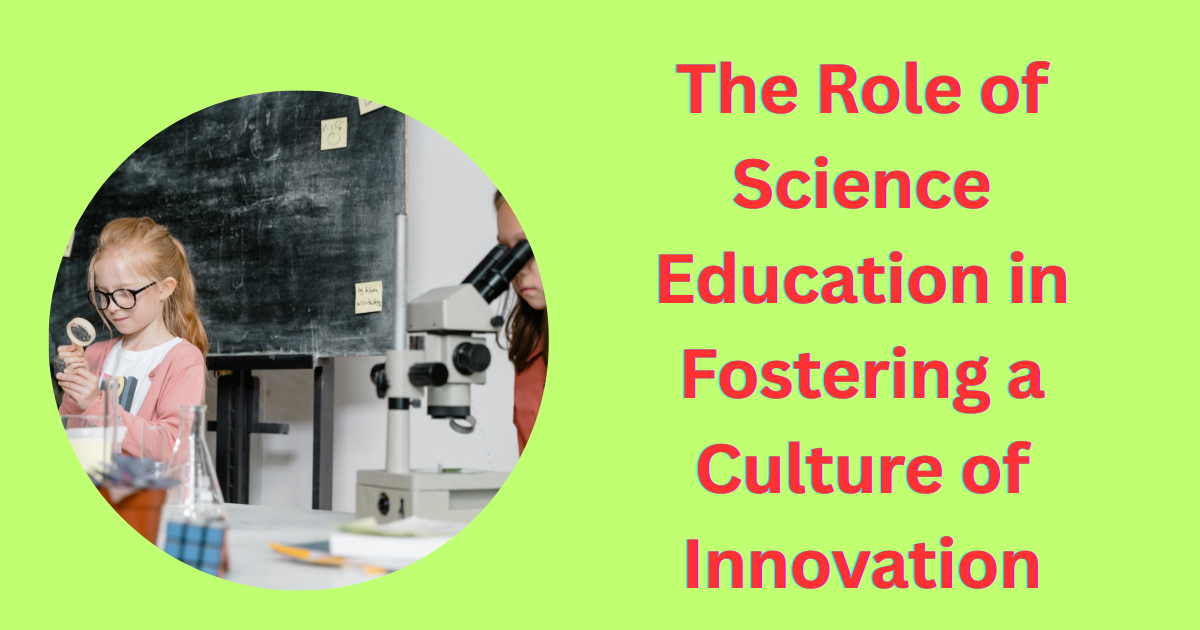The Role of Science Education in Fostering a Culture of Innovation: The reason is simple: almost all high added-value products embody elements of scientific knowledge, but science is only one of a plurality of other sources of knowledge that induce innovation-based growth.
The Role of Science Education in Fostering a Culture of Innovation
Science is the systematic study of the world around us. It involves observation, questioning understanding, and gathering evidence to make conclusions. Science is not a subject to be learnt but a way of understanding the world.

Focus on the Process of Science
Focusing on teaching the results of discoveries like facts, principles, and application while ignoring the process through which these discoveries were made, the learning experience remains incomplete. The scientific process of observing, hypothesising, experimenting and validating conclusions is just as necessary as the knowledge gained.
Science education should focus on developing competencies leading to abilities like problem-solving, hard thinking, and investigative skills. These abilities are best through experiential learning and inquiry-based pedagogy. From a young age, those students should be encouraged to investigate and explore, with the practice of “doing” science driving their learning.
Communication And Collaboration
Communication is important In science, without the ability to express ideas, share findings and enhance discussion, students miss out on confirmed opportunities to deepen their understanding and refine their thinking. Currently, science communication in many classrooms is confined to students providing predetermined answers to existing questions, which limits opportunities for collaborative learning.
Science Learning Spaces
Science classrooms should be reimagined as spaces that encourage students to be active learners rather than just passive recipients of information. Traditional verification-based experiments, which require students to reproduce known outcomes, limit their potential for true discovery and creative thinking. To help students gain a good understanding of science, educators should encourage exploration, allowing students to investigate concepts and make their own discoveries.
Facilitating learning, not teaching
In a rapidly evolving global learning landscape, the need for transformation in education is more urgent than ever. It is imperative that we make a concerted effort to embrace these changes, ensuring that our educational systems remain relevant, effective, and aligned with the future needs of learners.
Only through concerted efforts can we bring about a change that will equip future generations to thrive in a dynamic world.
Interdisciplinary Approach to learning
Science in the initial stages is to be presented holistically rather than deepening the boundaries of conveniences created, like physics, chemistry, and biology, among others. An interdisciplinary approach is essential to help students appreciate the beauty and interconnectedness of nature that might otherwise go unnoticed and evolve holistic solutions.
Education plays an important role in the culture of innovation and sustainability. They serve as catalysts for driving positive changes and addressing global challenges. This provides an overview of how higher education contributes to sustainability and innovation, emphasizing the theoretical linkages between educational policies, sustainable development goals, and innovative cultures. Innovative pedagogies are essential for promoting sustainability within higher education.
The role of Higher Education in Fostering a Culture of Innovation
Higher education institutions have a crucial role in advancing sustainable development goals (Lozano et al., 2015). The SDGs provide a framework for addressing global challenges, such as poverty, climate change, and inequality (Stevens &
Kanie, 2016). Universities can contribute to these goals by aligning their educational programs, research agendas, and campus operations with the SDGs (Sustainable Development Knowledge Platform).
This section of the exam examines various teaching methods you can find , such as experiential and problem-based learning, that effectively engage students in sustainability issues. Case studies on interdisciplinary approaches and the integration of technology showcase successful strategies for teaching sustainability in the education system. Collaboration between universities and industries is another key aspect of them. By forming partnerships and joint projects, academic institutions and industries are another key aspect. By forming partnerships and joint projects, academic institutions and industries can develop sustainable solutions to real-world problems.
Conclusion
In this article we discussed the role of science education in fostering a culture of innovation. Science education should focus on developing competencies leading to abilities like problem-solving, critical thinking, and investigative skills. And education plays an important role in the culture of innovation and sustainability. allowing students to investigate concepts and make their own discoveries.